China Railway CRH2
The CRH2 Hexie (simplified Chinese: 和谐号; traditional Chinese: 和諧號; pinyin: Héxié Hào; literally: "Harmony") is one of the high-speed train models in China. Originally, the CRH2 was based on the E2-1000 Series Shinkansen design from Japan with the license purchased from a consortium formed of Kawasaki Heavy Industries, Mitsubishi Electric, and Hitachi, and represents the second Shinkansen train model to be exported.
| China Railway CRH2 EMU | |
|---|---|
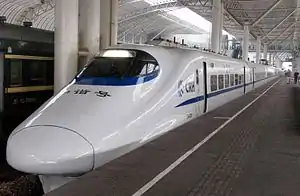 CRH2 at Nanjing railway station | |
| In service | 2007–present |
| Manufacturer | Kawasaki Heavy Industries, CRRC Qingdao Sifang |
| Family name | Shinkansen |
| Number built | CRH2A: 60+40 trainsets (800 cars) CRH2B: 20 trainsets (320 cars) CRH2C (stage 1): 30 trainsets (240 cars) CRH2C (stage 2): 20 trainsets (160 cars) CRH2E: 20 trainsets (320 cars) |
| Formation | CRH2A: 8 cars per trainset (4M4T) CRH2B/E: 16 cars per trainset (8M8T) CRH2C: 8 cars per trainset (6M2T) |
| Capacity | CRH2A: 610/571/562/588/600/608 CRH2B: 1230 CRH2C: 610/626 CRH2E: 630/880(CRH2E-2463, 2464 and 2465) |
| Operator(s) | China Railway - CR Beijing - CR Shanghai - CR Jinan - CR Xi'an - CR Wuhan - CR Nanchang - CR Zhengzhou - CR Taiyuan - CR Chengdu - CR Guangzhou - CR Nanning |
| Line(s) served | Most 200-250km/h high speed rail lines across China, plus some conventional lines |
| Specifications | |
| Train length | CRH2A/C: 201.4 m (661 ft) CRH2B/E: 401.4 m (1,317 ft) |
| Width | 3,380 mm (11 ft 1 in) |
| Height | 3,700 mm (12 ft 2 in) |
| Platform height | 1,250 mm (4 ft 1 in) |
| Maximum speed | CRH2A/B/E: 250 km/h (155 mph) CRH2C (stage 1): 350 km/h (217 mph) CRH2C (stage 2): 380 km/h (236 mph) |
| Traction system | IGBT VVVF inverter control (Mitsubishi Electric, Hitachi or Zhuzhou CSR Times Electric) |
| Power output | CRH2A: 4.8 MW (6,400 hp) CRH2B/E: 9.6 MW (12,900 hp) CRH2C (stage 1): 7.2 MW (9,700 hp) CRH2C (stage 2): 8.76 MW (11,750 hp) |
| Transmission | AC-DC-AC |
| Electric system(s) | 25 kV 50 Hz AC Overhead catenary |
| Current collection method | Pantograph |
| Braking system(s) | Regenerative, electronically controlled pneumatic brakes |
| Track gauge | 1,435 mm (4 ft 8 1⁄2 in) standard gauge |
In 2004, the Ministry of Railway in China purchased an initial 60 sets of the train from Kawasaki Heavy Industries with a maximum speed of 250 km/h (155 mph). However, the newer versions of the CRH2 are not related to the E2-1000 Series despite having the same exterior shell.[1]
Variants
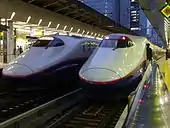
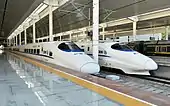
CRH2A
On October 20, 2004, the Ministry of Railway in China ordered 60 sets of CRH2A trains from Kawasaki Heavy Industries in Japan. Along with 60 sets of Bombardier's Regina-based CRH1A, and 40 sets of Alstom's Pendolino-based CRH5A, these train sets are consider as first batch of CRH trains.
Each of the CRH2A set consists of 8 cars. The first 3 sets (CRH2-001A - CRH2-003A) were built in Japan, the next 6 sets (CRH2-004A - CRH2-009A) were delivered in complete knock down form and assembled by CSR Sifang Locomotive and Rolling Stock. The remaining 51 sets (CRH2-010A - CRH2-060A) were built by Sifang through technology transfer from Japan.
The first train arrived at Qingdao port on March 8, 2006 with little fanfare, and was not even publicized in China. These trains have a maximum operation speed of 250 km/h (155 mph) and started providing high-speed train service from April 18, 2007, the date of the sixth national railway speed-up.
According to Chinese and Japanese media, CRH2A trains started test trials ahead of commercial operation on the Shanghai-Hangzhou and Shanghai-Nanjing lines on January 28, 2007.
On September 14, 2010, the Chinese MOR ordered additional 40 sets of CRH2A trains (CRH2-151A - CRH2-190A) from CSR Sifang.
CRH2B
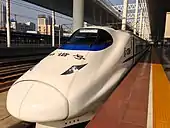
In November 2007, the Ministry of Railway in China ordered 10 CRH2 sets with 16 cars per set (8M8T). These trains have been given designations CRH2B (CRH2-111B - CRH2-120B). Each CRH2B has three 1st seating cars (ZY), twelve 2nd seating cars (ZE), and one dining car (CA). Designed maximum operation speed is 250 km/h (155 mph) with a power of 9,600 kW (12,900 hp).
The first units were delivered on June 29, 2008,[2][3] and came into service on the Hefei–Nanjing Passenger Railway on August 1, 2008.[4]
CRH2C (CRH2-350)
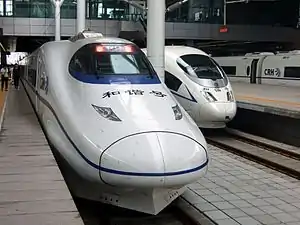
After the introduction of the modified E2-1000 Series, Sifang built its own CRH2 with a maximum safe operating speed of 350 km/h (220 mph). The original train sets imported from Kawasaki had a maximum safe operating speed of 250 km/h (160 mph).
During June 2005 and September 2005, The Chinese Ministry of Railways launched bidding for High speed trains with a top speed over 300 km/h (190 mph). Along with Siemens's Velaro-based CRH3C, CSR Sifang bid 60 sets of CRH2C, includes 30 sets of CRH2C stage one with a top speed of 300 km/h (190 mph), and 30 sets of CRH2C stage two with a top speed of 350 km/h (220 mph).
In development and research of the 350 km/h (220 mph) high speed train, The CRH2-300 project was launched by Chinese MOR and CSR. In 2006 the China Development Bank provided CNY 15 billion developmental financial loans to CSR Group for the projects of 200–300 km/h (120–190 mph) high speed trains.[5] Over 50 academics, 150,000 technicians, 600 contractors were involved in the project.[6] This train's livery is not like the CRH2A. Its blue stripe does not end at the fronts of trainsets.
CRH2C stage one

CRH2C Stage one is a modified version of CRH2A. It has a maximum operating speed up to 300 km/h (190 mph) by replacing two intermediate trailer cars with motorized cars. Equipped with an array of the state-of-the-art technologies, including aluminum alloy body with a reduced weight, high speed turntable, high speed pantograph, and optic-fiber based integrated control system.[7]
Chinese MOR ordered 30 sets of CRH2C stage one, name code CRH2-061C - CRH2-090C. The first set, CRH2-061C was unveiled on December 22, 2007.[8][9]
During the test on April 22, 2008, CRH2-061C reached a top speed of over 370 km/h (230 mph) on Beijing-Tianjin high-speed rail.[10]
During the test on December 11, 2009, CRH2-061C reached a top speed of 394.2 km/h (244.9 mph) on Zhengzhou-Xi'an high-speed rail.[11]
Together with CRH3C, the CRH2C stage one first came into service on Beijing-Tianjin Intercity high-speed rail on August 1, 2008, and all CRH2C stage one trains have been replaced by CRH3C in April, 2009. Currently, most of these trains are serving on the Shanghai-Nanjing high speed rail.
CRH2C stage two
CRH2C Stage two is the "re-design" version of the CRH2. Some of the details, like the aluminum body structure, noise reduction technology & reduction technique, draw on the CRH3C. According to CSR Sifang, the improvements include the following aspects:
- The axle weight of the bogie increased from 14 to 15 tonnes (31,000 to 33,000 lb), to prevent tremble of the train body at a higher speed,[6] the gear ratio has been optimized from 3.036 to 2.379, the critical instability speed is 550 km/h (340 mph).
- The thermal capacity of the bogie has been increased, which satisfied the continuous operation at 350 km/h (220 mph)
- With the YQ-365 type AC traction motor. It has a maximum operating speed up to 350 km/h (220 mph) with a power of 8,760 kW (11,750 hp).
- The rigidity of the car body has been increased to lower the noise and vibration.
- Optimized car body and window design for better air tightness and strength.
- Added pressure protection system to avoid pressure fluctuation in the compartment and improvement of comfort.
- Optimized design of the roof antenna, exterior windscreen and windows for a lower air resistance.[12]
Chinese MOR ordered 30 sets of CRH2C stage two, name code CRH2-091C - CRH2-110C and CRH2-141C - CRH2-150C. The first set, CRH2-091C was unveiled in January 2010 and came into service on Zhengzhou-Xi'an high-speed rail in February, 2010.[13]
CRH2E
.JPG.webp)
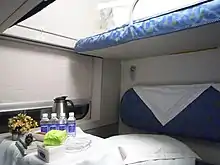
In November and December 2007, the Ministry of Railway in China ordered 20 CRH2 sleeper trains with 16 cars per set (8M8T). These trains are modified CRH2Bs, outfitted with traditional railway sleeping berths (couchette car) and have been given designations CRH2E (numbered CRH2-121E - CRH2-140E). Each CRH2E has thirteen 1st class sleeping cars (WR), two 2nd class seating cars (ZE), and one buffet car (CA) or one second class/dining car (ZEC). Designed maximum operation speed is 250 km/h (160 mph) with 9600 kW of power output.
The first batch of CRH2E, CRH2-121E - CRH2-126E, came into service on Beijing-Shanghai railway on December 21, 2008.[2][14] On 23 July 2011, one sleeper coach on CRH2-139E trainset has been derailed in the 2011 Wenzhou train collision, together with CRH1-046B.
The rest of CRH2Es were deployed on Beijing–Guangzhou–Shenzhen–Hong Kong High-Speed Railway since January 2015, operating overnight sleeper trains between Beijing and Guangzhou (including some trains to Shenzhen).
Double Deck CRH2E
A brand new variant of the CRH2E entered service in 2017 numbered beyond CRH2E-2463.[15][16] Instead of a traditional railway sleeping berth the sleeper train is organized with the corridor running down the middle of the traincar with double deck "capsules" on each side.[17] Each capsule is similar in layout to airplane first class, and passengers are no longer sharing the room. Each capsule comes with independent tables, outlets, lamps, hangers and curtains. The body of the train is redesigned to reduce noise levels during travel. The trains have been dubbed "moving hotels".[18]
.jpg.webp)
.jpg.webp)
.jpg.webp)
CRH2G
CRH2G is a specialized cold and sand/windstorm resistant version of the CRH2 manufactured by CRRC Qingdao Sifang. The trains were tested on the Lanzhou–Xinjiang HSR and Harbin–Dalian HSR.[19] Tests where completed on November 10, 2015 and the first sets were assigned to Lanzhou–Xinjiang HSR.[20]
CRH2-380
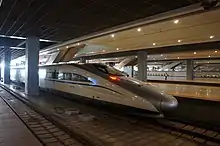
In 2008, the Chinese MOR & CSR launched CRH2-380 project, the main purpose is to develop new-generation of high speed trains with maximum operation speed of 380 km/h (240 mph). CRH2 is one of the fundamental platforms of the new trains, which is designated as CRH380A.
Formation
At the time of the sixth national railway speed-up, at least 37 CRH2A sets had been delivered by Kawasaki and Sifang.[21] In 2008, all 60 CRH2A sets had been delivered by Kawasaki. The post-2008 production model of the CRH2 are designed and made solely by Sifang with a maximum safe operation speed of 350 km/h (220 mph).[1]
Power Destination
- M - Motor car
- T - Trailer car
- C - Driver cabin
- P - Pantograph
Coach Type
- ZY - First Class Coach
- ZE - Second Class Coach
- ZYE - First Class/Second Class Coach
- ZEC - Second Class Coach/Buffet Car
- CA - Buffet Car
- WR - Soft Sleeper Car
- WRC - Soft Sleeper Car / Dining Coach
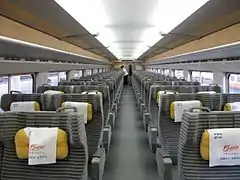 First Class Coach
First Class Coach Second Class Coach
Second Class Coach Buffet Car
Buffet Car The buffet car of the CRH2E
The buffet car of the CRH2E Compartment Connection
Compartment Connection
CRH2A (Previous)
| Coach No. | 1 | 2 | 3 | 4 | 5 | 6 | 7 | 8 |
|---|---|---|---|---|---|---|---|---|
| Type1 | ZE | ZEC | ZE | ZY | ZE | |||
| Type2 | ZE | ZY | ZE | ZEC | ZE | ZY | ZE | |
| Type3 | ZE | ZET | ZE | ZEC | ZE | ZY | ZE | |
| Type4 | ZYS | ZE | ZE | ZEC | ZE | ZYT | ||
| Type5 | ZY | ZE | ZEC | ZE | ZY | |||
| Type6 | ZE | ZEC | ZY | ZE | ||||
| Type7 | ZE | ZYE | ZE | ZEC | ZE | ZY | ZE | |
| Type8 | ZY | ZE | ZEC | ZE | ||||
| Power Configuration | TC | M | TP | T | MP | M | TC | |
| Power Units | Unit 1 | Unit 2 | ||||||
| Capacity1 | 55 | 100 | 85 | 100 | 55 (+16) | 100 | 51 | 64 |
| Capacity2 | 55 | 100 | 46 | 100 | 55 (+16) | 100 | 51 | 64 |
| Capacity3 | 55 | 100 | 43+16 | 100 | 55 (+16) | 100 | 51 | 64 |
| Capacity4 | 15+4 | 51+4 | 85 | 100 | 55 (+16) | 100 | 24+4 | 24+4 |
| Capacity5 | 42 | 78 | 85 | 100 | 55 (+16) | 100 | 51 | 51 |
| Capacity6 | 55 | 100 | 85 | 100 | 55 (+16) | 78 | 51 | 64 |
| Capacity7 | 55 | 100 | 16+43 | 100 | 71 | 100 | 51 | 64 |
| Capacity8 | 48 | 90 | 90 | 77 | 63 | 90 | 90 | 65 |
- ^1 Other train sets
- ^2 Set Nº. 2006, 2011 and 2021
- ^3 Set Nº. 2015, 2027 and 2030
- ^4 Set Nº. 2042
- ^5 Set Nº. 2043
- ^6 Set Nº. 2044–2060
- ^7 Set Nº. 2151–2211. Coach No. 3 has 16 First Class Seats and 43 Second Class seats
- ^8 Set Nº. 2212–2416, 2427–2460, 2473–2499, 2828, 4001–4071, 4082–4095 and 4114–4131
CRH2A (Renovated)
| Coach No. | 1 | 2 | 3 | 4 | 5 | 6 | 7 | 8 |
|---|---|---|---|---|---|---|---|---|
| Type1 | ZE | ZEC | ZE | ZY | ZE | |||
| Type2 (EC) | ZY | ZE | ZEC | ZE | ||||
| Power Configuration | TC | M | MP | M | MP | M | TC | |
| Power Units | Unit 1 | Unit 2 | ||||||
| Capacity1 | 55 | 100 | 85 | 100 | 55 (+16) | 100 | 51 | 64 |
| Capacity2 (EC) | 48 | 90 | 90 | 77 | 63 | 90 | 90 | 65 |
CRH2B
| Coach No. | 1 | 2 | 3 | 4 | 5 | 6 | 7 | 8 | 9 | 10 | 11 | 12 | 13 | 14 | 15 | 16 |
|---|---|---|---|---|---|---|---|---|---|---|---|---|---|---|---|---|
| Type | ZY | ZE | CA | ZE | ||||||||||||
| Power Configuration | TC | M | TP | T | M | T | M | T | TP | M | TC | |||||
| Power Units | Unit 1 | Unit 2 | Unit 3 | Unit 4 | ||||||||||||
| Capacity | 36 | 68 | 51 | 100 | 85 | 100 | 85 | (32) | 85 | 100 | 85 | 100 | 85 | 100 | 85 | 65 |
- Set Nº. 2111–2120, 2466–2472 and 4096–4105
CRH2C
| Coach No. | 1 | 2 | 3 | 4 | 5 | 6 | 7 | 8 |
|---|---|---|---|---|---|---|---|---|
| Type1 | ZE | ZEC | ZE | ZY | ZE | |||
| Type2 | ZE | ZEC | ZE | ZY | ZE | |||
| Power Configuration | TC | M | MP | M | MP | M | TC | |
| Power Units | Unit 1 | Unit 2 | ||||||
| Capacity1 | 55 | 100 | 85 | 100 | 55+16 | 100 | 51 | 64 |
| Capacity2 | 55 | 100 | 85 | 100 | 54+16 | 100 | 51 | 65 |
CRH2E
| Coach No. | 1 | 2 | 3 | 4 | 5 | 6 | 7 | 8 | 9 | 10 | 11 | 12 | 13 | 14 | 15 | 16 |
|---|---|---|---|---|---|---|---|---|---|---|---|---|---|---|---|---|
| Type1 | ZE | WR | CA | WR | ZE | |||||||||||
| Type2 | ZE | WR | WRC | WR | ZE | |||||||||||
| Type3 | WR | WRC | WR | |||||||||||||
| Power Configuration | TC | M | TP | T | M | T | M | T | TP | M | TC | |||||
| Power Units | Unit 1 | Unit 2 | Unit 3 | Unit 4 | ||||||||||||
| Capacity1 | 55 | 40 | 40 | 40 | 40 | 40 | 40 | (0) | 40 | 40 | 40 | 40 | 40 | 40 | 40 | 55 |
| Capacity2 | 55 | 40 | 40 | 40 | 40 | 40 | 40 | 40 | 20 | 40 | 40 | 40 | 40 | 40 | 40 | 55 |
| Capacity3 | 40 | 60 | 60 | 60 | 60 | 60 | 60 | 60 | 20 | 60 | 60 | 60 | 60 | 60 | 60 | 40 |
CRH2G
| Coach No. | 1 | 2 | 3 | 4 | 5 | 6 | 7 | 8 |
|---|---|---|---|---|---|---|---|---|
| Type | ZY | ZE | ZEC | ZE | ||||
| Power Configuration | TC | M | MP | M | MP | M | TC | |
| Power Units | Unit 1 | Unit 2 | ||||||
| Capacity | 48 | 90 | 90 | 77 | 63 | 90 | 90 | 65 |
- Set Nº. 2417–2426, 4072–4081 and 4106–4113
Accidents
On July 23rd, two bullet trains were traveling in the same direction and the train in front, the CRH 1-046B was stopped by a power failure or a faulty signal hit by lightning. The light that the second train was supposed to stop at was hit by lightning, malfunctioned and showed a green signal while it was supposed to be red. The second train was a CRH 2-139E. The CRH 2 front cars fell off the viaduct and one standing at a 90° angle between the viaduct and the ground. The cars that fell to the ground are cars 1-3 and the fourth one was the one standing.
Distribution
As of February, 2011
| Operator | Quantity | Serial number | Depot | Lines serving | Notes | |
|---|---|---|---|---|---|---|
| CRH2A | ||||||
| Beijing Railway Bureau | 2 | 2478, 2479 | Beijing | Beijing–Harbin Railway | ||
| Wuhan Railway Bureau | 24 | 2011, 2013, 2019, 2033, 2034, 2039, 2043, 2045 to 2051, 2053, 2055, 2169, 2179, 2180, 2200, 2205, 2206, 2209, 2210 | Hankou | Beijing–Guangzhou Railway, Shanghai–Wuhan–Chengdu High-Speed Railway, Hankou–Danjiangkou Railway | ||
| 24 | 2017, 2022, 2023, 2027, 2029, 2035, 2052, 2054, 2056, 2059, 2060, 2151, 2152, 2162-2164, 2173, 2192, 2193, 2199, 2201, 2207, 2208, 2211 | Wuhan | Shanghai–Wuhan–Chengdu High-Speed Railway | |||
| Shanghai Railway Bureau | 46 | 2001, 2003-2009, 2012, 2015, 2018, 2020, 2024, 2026, 2028, 2030, 2031, 2044, 2057, 2058, 2153, 2154, 2158, 2159, 2161, 2166-2168, 2174-2177, 2181~ 2184, 2186~2189, 2194~2196, 2202~2204 | Shanghai South | Shanghai–Hangzhou High-Speed Railway, Hangzhou–Fuzhou–Shenzhen High-Speed Railway, Shanghai–Wuhan–Chengdu High-Speed Railway, Jinshan Railway | ||
| 7 | 2021, 2032, 2041, 2155, 2157, 2185, 2190 | Hefei South | Hefei–Fuzhou High-Speed Railway, Nanjing–Anqing Intercity Railway | |||
| 12 | 2002, 2014, 2016, 2025, 2036-2039, 2156, 2160, 2165, 2178, 2197 | Nanjing | Nanjing–Qidong Railway, Nanjing–Anqing Intercity Railway | |||
| Nanchang Railway Bureau | 20 | 2215~2218, 2233, 2236, 2237, 2246, 2249, 2250, 2252, 2257, 2258, 2260, 2261, 2284, 2285, 2290, 2429, 2430 | Nanchang | Nanchang–Jiujiang Intercity Railway, Wuhan–Jiujiang Passenger Railway | ||
| 20 | 2212~2214, 2220~2224, 2247, 2248, 2251, 2253~2256, 2259, 2291~2293, 2302 | Nanchang West | Xiangtang–Putian Railway | |||
| 18 | 2219, 2234, 2235, 2282, 2283, 2324, 2427, 2447, 2452, 2457, 2458, 4006, 4045 ~ 4050 | Xiamen North | Shanghai–Hangzhou High-Speed Railway, Hangzhou–Fuzhou–Shenzhen High-Speed Railway | |||
| 3 | Fuzhou South | Shanghai–Hangzhou High-Speed Railway, Hangzhou–Fuzhou–Shenzhen High-Speed Railway, Xiangtang–Putian Railway | ||||
| 23 | 2275, 2434 to 2437, 2440 to 2442, 2446, 2455, 2456, 2476, 2477, 2493, 2494, 4008, 4009, 4012 to 4017 | Longyan | Shanghai–Hangzhou High-Speed Railway, Hangzhou–Fuzhou–Shenzhen High-Speed Railway, Longyan–Xiamen Railway | |||
| Chengdu Railway Bureau | 31 | 2230, 2231, 2272, 2305, 2321, 2323, 2325, 2333, 2335 to 2340, 2363, 2374, 2385, 2390, 2438, 2480 to 2482, 2491, 4007, 4022, 4035 to 4040 | Chongqing North | Shanghai–Wuhan–Chengdu High-Speed Railway, Nanjing–Hangzhou High-Speed Railway, Wuhan–Jiujiang Passenger Railway | ||
| 22 | 2040, 2042, 2170-2172 , 2191 , 2198 , 2228 , 2304 , 2360 , 2364 , 2373 , 2391 , 2392 , 2395-2397 , 2490 , 2492 , 4020 , 4023, 4042 | Guiyang North | Guiyang–Guangzhou High-Speed Railway, Hengyang–Liuzhou Intercity Railway, Liuzhou–Nanning Intercity Railway | |||
| Nanning Railway Bureau | 54 | 2238, 2240 to 2245, 2262, 2263, 2269, 2270, 2276, 2281, 2286, 2287, 2296, 2297, 2303, 2312 to 2315, 2327, 2328, 2346 to 2348, 2351, 2370, 2371, 2375, 2377, 2378, 2383, 2386, 2387, 2393, 2394, 2398, 2399, 2401, 2404, 2407, 2443 to 2445, 2450, 4018, 4027, 4031, 4032, 4069, 4114, 4115 | Nanning | Hengyang–Liuzhou Intercity Railway, Liuzhou–Nanning Intercity Railway, Guiyang–Guangzhou High-Speed Railway, Nanning–Guangzhou High-Speed Railway | ||
| 40 | 2239, 2266, 2277 to 2280, 2288, 2289, 2300, 2301, 2306, 2307, 2366 to 2369, 2376, 2384, 2400, 2402, 2412, 2413, 2431 to 2433, 2439, 4033, 4034, 4041, 4043, 4044, 4068, 4070, 4071, 4116 ~ 4121 | Guilin North | Hengyang–Liuzhou Intercity Railway, Liuzhou–Nanning Intercity Railway, Guiyang–Guangzhou High-Speed Railway, Nanning–Guangzhou High-Speed Railway | |||
| China MOR | 1 | 2828 | Official Train | |||
| 1 | 2010 | Track Inspection Train | ||||
| CRH2B | ||||||
| Shanghai Railway Bureau | 10 | 2111~2120 | Nanjing | Shanghai–Wuhan–Chengdu High-Speed Railway, Shanghai–Hangzhou High-Speed Railway, Hangzhou–Fuzhou–Shenzhen High-Speed Railway | ||
| CRH2C | ||||||
| Shanghai Railway Bureau | 27 | 2062~2067, 2069~2090 | Nanjing South | Shanghai–Hangzhou High-Speed Railway, Hangzhou–Ningbo High-Speed Railway, Shanghai–Nanjing Intercity Railway, Nanjing–Hangzhou High-Speed Railway | ||
| 18 | 2097~2110, 2141~2144 | Hefei South | Hefei–Nanjing Passenger Railway, Nanjing–Hangzhou High-Speed Railway, Shanghai–Nanjing Intercity Railway | |||
| Xi'an Railway Bureau | 9 | 2091~2096, 2145~2149 | Xi'an North | Zhengzhou–Xi'an High-Speed Railway | ||
| China MOR | 3 | 2061, 2068, 2150 | Track Inspection Train | |||
| CRH2E | ||||||
| Beijing Railway Bureau | 19 | 2121~2126, 2128, 2130~2138, 2463~2465 | Beijing | Beijing–Shanghai Railway, Beijing–Guangzhou High-Speed Railway, Guangzhou–Zhuhai Intercity Railway | ||
| CRH2J | ||||||
| China Railway Corporation | 1 | 0205 | N/A | Comprehensive inspection trains in orange livery | ||
See also
References
- Japan Inc Shoots Itself on the Foot
- 关于动卧车票及CRH2系列列车的一些最新消息!
- 视频:我国首列具自主知识产权长大编组动车组下线
- 上海至合肥动车昨首发 全程3.5小时
- 南车集团高速列车项目获国家开发银行150亿贷款
- High Speed Rail (HSR) in China: 5 Years Equals 40 Years Archived 2013-01-01 at Archive.today
- Proprietary High Speed Locomotives
- 我国自主研制的首列时速300公里动车组下线
- 国产首列时速300公里"和谐号"动车组成功下线 Archived 2008-04-03 at the Wayback Machine
- 京津城际列车跑出370公里时速 创国产动车组纪录 Archived 2008-04-29 at the Wayback Machine
- "最高时速394.2公里比波音747起飞时还快". Archived from the original on 2017-08-27. Retrieved 2010-10-20.
- CRH2C page on CSR Sifang official site
- 南车青岛四方股份造动车组装备郑西高铁
- 南车四方自主研制的世界首批长大编组卧车动车组投入运营 Archived 2016-03-03 at the Wayback Machine
- "我国首列时速250公里纵向卧铺动车组下线-南方都市报·奥一网". epaper.oeeee.com. Retrieved 2020-06-07.
- "都是小"包间"!中国推出最新型纵向卧铺动车组-中新网". www.chinanews.com. Retrieved 2020-06-07.
- "中国第一款纵向布局"双层"卧铺动车组下线 - 行业 - 人民铁道网 - 中国官方铁路门户". www.peoplerail.com. Retrieved 2017-07-02.
- "China's New High-Speed Sleeper Train is Literally a 'Moving Hotel'". nextshark. July 2017.
- "中国高寒动车组拿到市场"准生证",零下40℃照样跑_10%公司_澎湃新闻-The Paper". www.thepaper.cn. Retrieved 2020-06-07.
- xj.people.com.cn http://xj.people.com.cn/n/2015/1210/c188521-27291462.html. Retrieved 2020-06-07. Missing or empty
|title=(help) - 52列動車組將投入運營 37列為南車四方制造的和諧號CRH2型 Archived 2007-10-31 at the Wayback Machine, Science and Technology Daily
External links
 Media related to China Railways CRH2 at Wikimedia Commons
Media related to China Railways CRH2 at Wikimedia Commons



